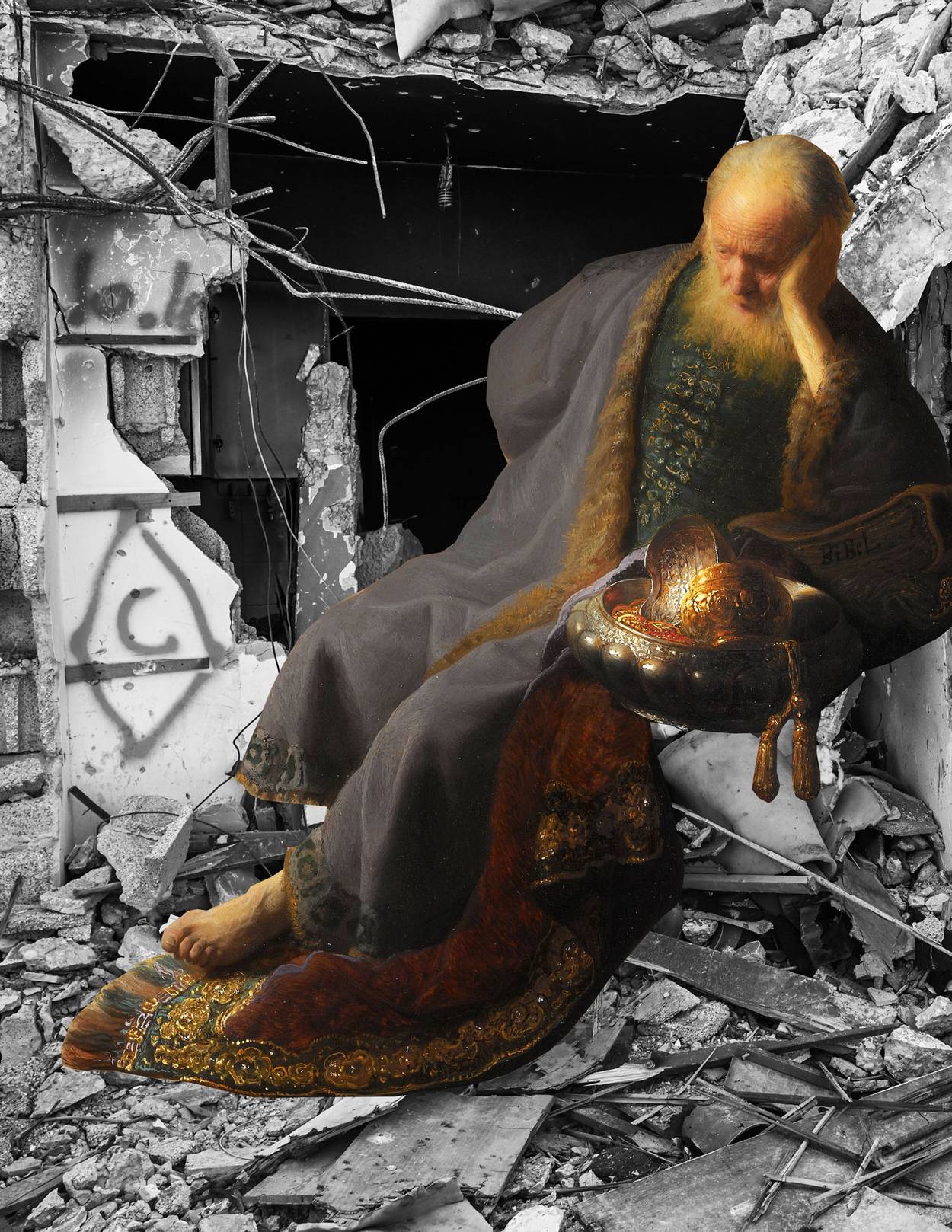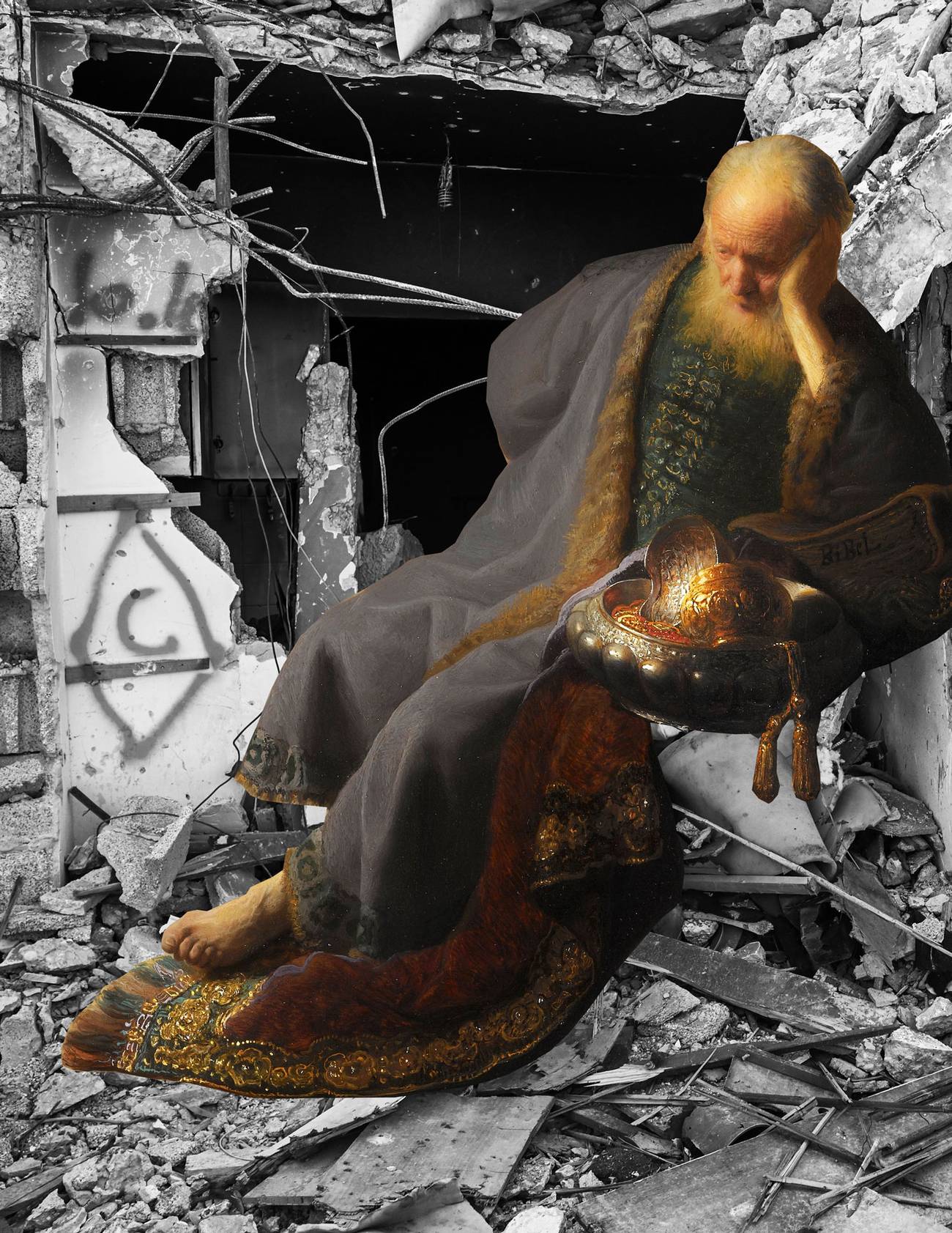Hateful enemies dedicated to the destruction of Israel gathered at walls meant to defend the safety and security of the Jewish state. Their foes breaching the gates and wreaking ruination and death, the Jewish people were shocked that their defenses had failed. They mourned how their infighting had made them vulnerable and their military had been overcome, and wondered aloud why their allies had failed to voice support when it was needed most.
No, I’m not talking about Hamas’ surprise attack on Simchat Torah. I’m talking about the Babylonian forces’ siege of Jerusalem commemorated on the fast day of the 10th of the Hebrew month of Tevet, marked this year on Friday, Dec. 22. The armies of Nebuchadnezzar II would eventually not only defeat the Jewish soldiers; they would destroy the Holy Temple, the source of Jewish spiritual fortitude and national unity.
Much ink has been spilled over the Jewish blood of the Oct. 7 massacre reopening the 50-year-old wounds of 1973’s Yom Kippur War. But the flesh was actually first cut in Tevet, in 588 BCE.
Recoiling in shock over the extent of the devastation millennia ago, the Prophet Jeremiah, in the book of Lamentations, expressed the mood of national morosity: “Bitterly she weeps in the night, Her cheek wet with tears. There is none to comfort her.” When the video of Hamas’ atrocities, compiled from the terrorists’ own bodycams, were shown to members of Israel’s Knesset, many could not handle the anguish. “One of the members of Knesset who saw the film told me that she had to take sedatives for three days afterward and was having chest pains,” reported one clinical psychologist.
“Zion’s roads are in mourning, empty of festival pilgrims; all her gates are deserted,” the ancient prophet continued. “In Tel Aviv and Jerusalem, empty streets and supermarket shelves offer eerie signs of war,” lamented the Jewish Telegraphic Agency days after the Hamas attack.
Deepening the loss was the abandonment of allies. “Her friends have betrayed her; they have become her foes,” reported Jeremiah, “when enemies looked on and gloated over her downfall.”
The Abraham Accords countries’ relationships with Israel—friendships hailed as the signaling of a new dawn in the Middle East—became almost immediately strained following Oct. 7. Days after the Hamas attack, thousands of Moroccans rallied in Rabat to demand annulment of the 2020 normalization agreement. The country’s Islamist Justice and Development Party praised the Hamas invasion and its beheadings, kidnapping, and rape as “natural and legitimate reaction to daily violations” and “a heroic act.”
Bahrain’s parliament announced that its ambassador to Israel had left, the Israeli ambassador sent home, and economic ties have been suspended due to its “historic position in support of the Palestinian cause.”
Turkey, which had reestablished ties with Israel in 2022, and whose leader, Recep Tayyip Erdogan, held a warm meeting with Jewish leaders as recently as late September, called Israel “completely out of its mind” after its response to Hamas’ attack and banned Coke and Nestle products from its parliamentary cafeteria over the companies’ supposed support of the Jewish state.
Israelis will find undoubtedly particular resonance in the fast day prayers this year. In times of peace, laments over what ancient enemies had wrought felt foreign. No longer.
Yet comfort can be found in noting the difference between past and present.
Today’s Israel might be abandoned by some previously thought of as friends, but others stand steadfast by its side. The leaders of the U.S., U.K., France, Germany, and Italy all visited as a show of solidarity. The UAE issued a statement in which it described Hamas’ violence as “serious and grave escalation” and said it was “appalled.” The deputy foreign minister of the Czech Republic lambasted the U.N.’s call for a ceasefire, which had “completely ignored the brutal rampage of Hamas or the fact that there are still 200 people, including children, kidnapped in Gaza, and focused only on what is happening in Gaza.” India’s Prime Minister Narendra Modi, whose country did not have diplomatic relations with Israel until 1992, tweeted: “Our thoughts and prayers are with the innocent victims and their families. We stand in solidarity with Israel at this difficult hour.” At an Arab League meeting in Riyadh, Bahrain and Morocco rejected a measure to sever diplomatic ties with Israel.
The Jewish state, this time, is not alone in its fight.
The same country that so many observers, both within its own press and worldwide, had believed any semblance of societal unity to be a delusion now bears witness to factions once thought oppositional joining in the spirit of friendship. Ultra-Orthodox youth are enlisting in the IDF. Protesters of the proposed judicial reform serve, in tanks, alongside the think-tank policy wonks whose efforts they had, just weeks prior, taken to the streets to oppose. Secular news anchors don kippot to make blessings on the rescuing of hostages.
The ancient sixth-century Prophet Zechariah envisioned a time when fast days would become feasts, when days of loss “shall be joy and gladness for the house of Judah, and cheerful seasons; therefore love truth and peace.” The only way that the fasts will turn into holidays, argued the 16th-century scholar known as the Maharsha, would be when truth and peace were both present and valued. Perhaps the international support is this truth and this period of societal unity in Israel is this peace.
The 10th of Tevet, wrote the late Rabbi Jonathan Sacks, “represents the Jewish people under siege.”
There are two ways to respond, he argued.
One is by embracing the allure of assimilation. “Do you attempt to acclimatize and acculturate yourself to the world around you, the world that seems threatening?” Some, the un-Jews, like Jewish Voice for Peace, answered in the affirmative, choosing the side of so many American campuses and of Qatar. They have thrown in their lot with our enemies, thinking that salvation can be found in renouncing the faith of their fathers in the name of some perverse supposed progressivism. They have already begun to receive their due punishment.
Rabbi Sacks then offered a second answer to his own question:
the way to react is not to, as it were, submit to the cultural imperatives of the larger society and simply try to disappear. This doesn’t work. The truer response is … to strengthen ourselves spiritually. Because as Zechariah said, in the Haftarah of Hanukkah, Lo b’chayil v’lo bakoach, ki im b’ruchi. “The Jewish people survives not by strength or by power”—though those are certainly necessary—“but ‘by My Spirit,’” says the Lord.
Truth and peace can be forged by faith and friendship. These are the elements from which strength and power emerge.
Whether it’s Tel Aviv eateries making their kitchens kosher for hungry soldiers, volunteers helping to keep Israeli farms afloat, or thousands of gentiles standing side-by-side in Washington with their Jewish friends and colleagues, the darkness of despair is being defeated by the dynamics of the spiritually and societally united.
While much prayer remains to be uttered and mourning to be expressed this 10th of Tevet, there is, amid the hunger, opportunity to be found. A traditional fast marking a traumatic vanquishing, this year, may be an occasion to offer a small measure of comfort to an Israel yet victorious.

